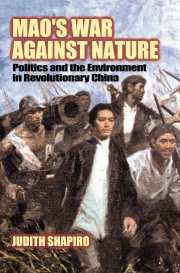Book contents
- Frontmatter
- Contents
- Chinese Measurement Equivalents
- Preface
- INTRODUCTION
- 1 POPULATION, DAMS, AND POLITICAL REPRESSION
- 2 DEFORESTATION, FAMINE, AND UTOPIAN URGENCY
- 3 GRAINFIELDS IN LAKES AND DOGMATIC UNIFORMITY
- 4 WAR PREPARATIONS AND FORCIBLE RELOCATIONS
- 5 THE LEGACY
- Notes
- Bibliography
- Index
- Plate section
1 - POPULATION, DAMS, AND POLITICAL REPRESSION
A Story of Two Environmental Disasters and the Scientists Who Tried to Avert Them
Published online by Cambridge University Press: 15 August 2009
- Frontmatter
- Contents
- Chinese Measurement Equivalents
- Preface
- INTRODUCTION
- 1 POPULATION, DAMS, AND POLITICAL REPRESSION
- 2 DEFORESTATION, FAMINE, AND UTOPIAN URGENCY
- 3 GRAINFIELDS IN LAKES AND DOGMATIC UNIFORMITY
- 4 WAR PREPARATIONS AND FORCIBLE RELOCATIONS
- 5 THE LEGACY
- Notes
- Bibliography
- Index
- Plate section
Summary
Our story begins not in the physical world but in the political one – with a struggle among human beings. In the summer of 1957, just a few years after the 1949 Communist victory, hundreds of thousands of China's most distinguished scholars and scientists were criticized, harshly punished, ostracized, and silenced in an “Anti-rightist movement.” By destroying those who sought simply to perform the Chinese intellectual's traditional duty to speak out in order to assist the country's leaders to govern better, China deprived itself of authoritative voices that might have cautioned against foolhardy schemes that ultimately destroyed the natural environment. People from many levels of society contributed to the events that will be described in the coming pages. However, as we shall see, Mao played a leading role in launching the Anti-rightist movement, as he did in numerous subsequent decisions that affected China's environment for the worse. His mistrust of intellectuals and reluctance to listen to differing opinions were essential preconditions for his efforts to transform China along lines that ignored the laws of natural science. The stories of any of hundreds of individuals might have illustrated the impact of the Anti-rightist movement on China's environment, but we focus on two senior intellectuals, economist Ma Yinchu and hydro-engineer Huang Wanli. Their “bitter love” of their country was typical of a generation whose patriotism caused them endless suffering and whose repression changed China's relationship with the natural world in important ways.
- Type
- Chapter
- Information
- Mao's War against NaturePolitics and the Environment in Revolutionary China, pp. 21 - 66Publisher: Cambridge University PressPrint publication year: 2001

